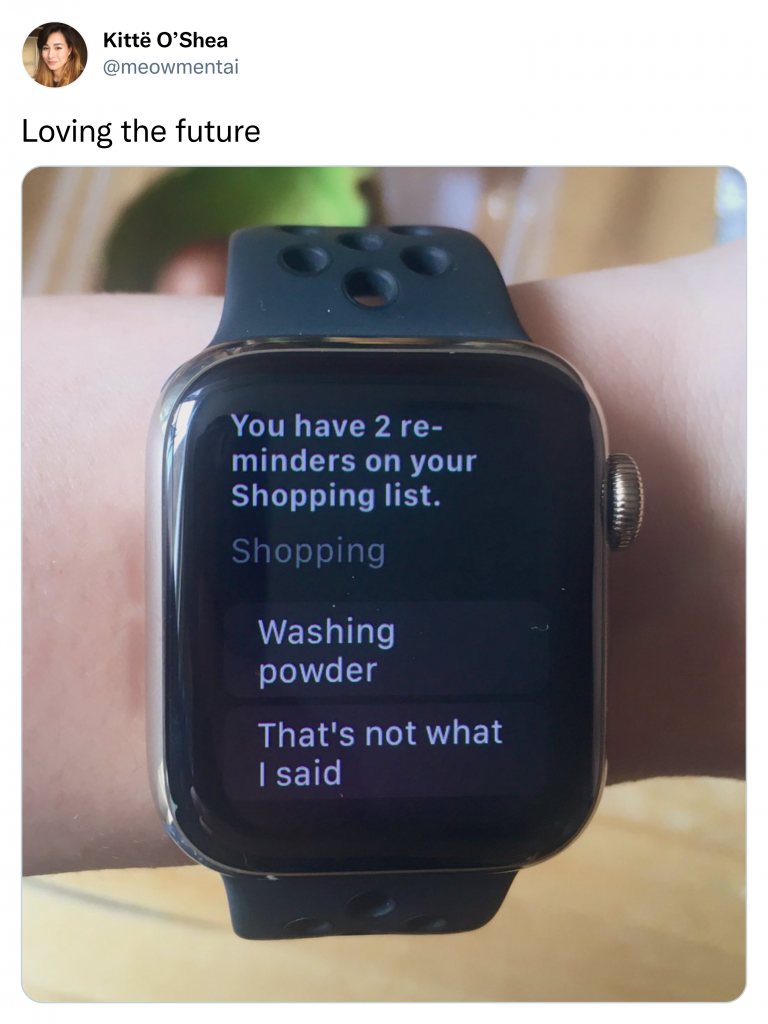1. Good Monday Morning
We are back from hiatus, and boy, it felt great. Writing Spotlight is a hard habit to break. We didn’t get a chance to acknowledge Mother’s Day last week so thank you to all of the moms out there, especially the non-biological ones. I see you.
2. News To Know Now
Quoted: “We are pursuing two goals here. First is: We are notifying their relatives, and telling them, basically, that it’s not a very good idea to go to war with Ukraine. So that serves as a cautionary tale. And secondly, it’s a humanitarian purpose — just telling them where their relatives, or friends, or children are so that they don’t try to get this information from the Russian authorities. Because, more often than not, they can’t.” — Mykhailo Fedorov, Ukraine’s 31-year-old minister for digital transformation, to Wired on how that country is using facial recognition software on Russian soldiers killed in the country.
a) Google is making free training available to U.S. companies who want to retrain their employees. They’ve partnered with Coursera to offer up to 500 Google Career Certificates free per company in disciplines such as IT, Digital Marketing, Data Analytics, Project Management, and Design.
b) A federal judge ordered all U.S. internet service providers to block three pirate streaming services in three separate rulings covering all ISPs. The rulings contain lists of 96 companies, but the ruling orders all ISPs to comply, regardless of whether they are on the list. That sounds great, in theory, but remember that what you just read is that a federal district court judge ordered three organizations to be removed from online access by any American.
c) European policymakers have passed sweeping legislation that will ban tech companies operating on the continent from microtargeting consumers with ads. Companies will also be required to moderate harmful content as if they were a publisher instead of a platform. The complete rules are not yet public, but also include algorithmic transparency requirements and a ban on data harvesting. Member countries must now ratify the new rules, which are expected to take effect in 2024.
3. Search Engine News — Google Analytics Will Require Upgrade
Google Analytics 4 is a more robust platform that requires a bit more configuration than previous versions. It’s still something that most organizations can handle by themselves, especially if they have internal marketing and web development staff.
You should be planning now to switch because Google says all earlier versions will stop receiving new data on July 1, 2023. Here is the migration info to give to your team.
4. Spotlight Explainer — Location Privacy Is a Joke
Location privacy doesn’t exist because data collected by your phone, your computer, your car, and all of your other devices is available to anyone willing to pay for it, not just law enforcement. There are times that this is good. Domestic terrorists who overran the Capitol on Jan. 6 quickly learned that their phones and internet activity provided prosecutors with airtight cases against them.
Those very same programs may soon be used against women if the U.S. Supreme Court overturns Roe v. Wade. Thirteen states have already passed so-called trigger laws that immediately ban abortion in the state if Roe is overturned. Many have variants that prohibit traveling out of state for abortion, obtaining over-the-counter Plan B medication, and other severe civil right infringements.
Many of you write and share kind compliments with us about how Spotlight helps you understand complex digital issues. We’re going to do that over the next few hundred words as it relates to location privacy because that is the linchpin that state law enforcement agencies can use to help prosecute women seeking an abortion. And these are not light penalties. In many states, a woman can be charged with manslaughter. Louisiana is among states advancing legislation that would define personhood as the moment of conception and classify abortion as homicide.
Location Data is Already Used to Ruin People
Last July, a Catholic website published an expose accusing a general secretary of the U.S. bishops’ conference of “serial sexual misconduct.” The monsignor they named was the highest-ranking Catholic clergyman in the U.S. who is not a bishop. He resigned, but the site published his location data along with dates and times although no other proof of wrongdoing.
That data used was from Grindr, a dating app focused on the LGBTQ community. It’s a site many would incorrectly assume had some level of location privacy. The advertising networks used on the site collect data from user devices to target people with appropriate ads. One of the networks then packaged and sold the data to a third party. The Wall Street Journal quoted a spokesperson as saying, “Every single entity in the advertising ecosystem has access to the information shared by Grindr and every other app that uses the real-time bidding system. That means thousands of entities have such access.”
Your Data Is Available Everywhere
About 50 companies in the U.S. sell location data captured by mobile phones. There are entire subsets of information from phones traveling in vehicles, including airplanes, bicycles, and trains. Last year The Markup reported that brokers were selling access to the data from 1.9 billion devices, and last week Vice identified that SafeGraph was selling data from people it identified in Planned Parenthood facilities. Their data, including the address they came from and where they went after, was available for $160. Not per person. That’s the price for the whole data set for one week.
Three days ago, I went to a SafeGraph competitor and did the same thing. After I confirmed that I could look at doctor’s offices or stores, I got creative in my own neighborhood to see what I could actually buy. As I expected, the answer was a lot. People in or near certain stores, bars, or schools, were all data sets that were available.
It’s Not Just Location Data
Sure, if you were someone seeking an abortion where it is illegal, you might be able to leave your phone at home and use public transportation or other means to travel. But any of your other internet activity — at home, work, or elsewhere — can be used against you. That worries lawmakers like Sen. Ron Wyden (D-OR) who told Gizmodo about location privacy, “Every digital record — from web searches, to phone records and app data — will be weaponized in Republican states as a way to control women’s bodies.”
That’s how police and prosecutors unravel cases like kidnappings or school shootings. The exact same processes can be used to investigate and charge women. Remember that laws such as the ones already passed in Texas and Oklahoma, allow individuals to sue anyone involved in aiding an abortion. The person filing suit can be a private citizen with no connection to anyone in the matter.
Big tech companies obviously don’t want their data used in this way, but they have very little choice when presented with a law enforcement subpoena.
Period Tracking Apps Are Huge Targets
You can use personal tech for anything health-related whether that’s cycle tracking, CPAP metrics, or even diet, but none of the data you put in that app is protected by health privacy laws, including HIPAA.
Some period tracking apps actually sell the data in so-called anonymized bundles, but all are as susceptible to a law enforcement subpoena as Google or Facebook.
The Bottom Line
The best recommendations I’ve seen so far are at the Electronic Frontier Foundation. Remember that a browser’s incognito mode only means that the information isn’t stored on your computer. The service provider selling you internet access and the websites you visit still receive your data. And VPNs are an important piece of security, but the same issues apply. They protect your data between your device and your internet connection. Neither provides you with anonymity.
5. Did That Really Happen? — No, a Pfizer Exec Was Not Arrested
A satire site published a piece last Friday about a Pfizer exec’s arrest after a hoax about its COVID vaccine risks. The story was false and carried a disclaimer, but that didn’t stop it from going viral over the next few hours, including the executive’s real name and position. The viral copies did not include the disclaimer.
The people you know who quote conspiracy theories will tell you that major media sites aren’t covering it because they’re involved in a cover-up.
6. Following Up — Intuit TuboTax to Refund Million
We’ve been writing for years about Intuit and their checkered participation in the IRS’ Free File program. The FTC eventually led an effort joined by states that complained that the company misrepresented eligibility to consumers. After finally pulling out of the program last tax season, Intuit agreed last week to reimburse more than 4 million people who bought its TurboTax software between 2016 and 2018. CNET has the info on who is eligible.
7. Protip — Get Your Contact Info Off Google
Google will finally allow you to begin removing your personal information such as telephone number and email address from the search engine. It’s not automatic. Some information from government, news, or professional websites won’t be removed.
But if you’re regular folk like me and just want your home phone number and address removed from search results, they can make that happen.
You have to do the work to supply Google with the URL you want removed. It’s important to note that websites like Internet Archive or other caching systems may already have made copies of the page, and your information is still at the organizations that published it, but you can make searching for you a little less easy.
Start at this Google page that explains how.
8. Screening Room — Nurse’s Week
9. Science Fiction World — Chili’s Expands Rita Robot Test
Baby back ribs or not, Chili’s is expanding its Rita Robot program from 10 locations to 61 throughout the chain. The robot seats guests, brings out food, and can even sing Happy Birthday. Have look at Rita and how she is used here.
10. Coffee Break — Public Pianos
Ready to channel your inner Ray Charles? This searchable database shows you the location and other information about more than 8,000 pianos in public that you can play for free.
11. Sign of The Times

